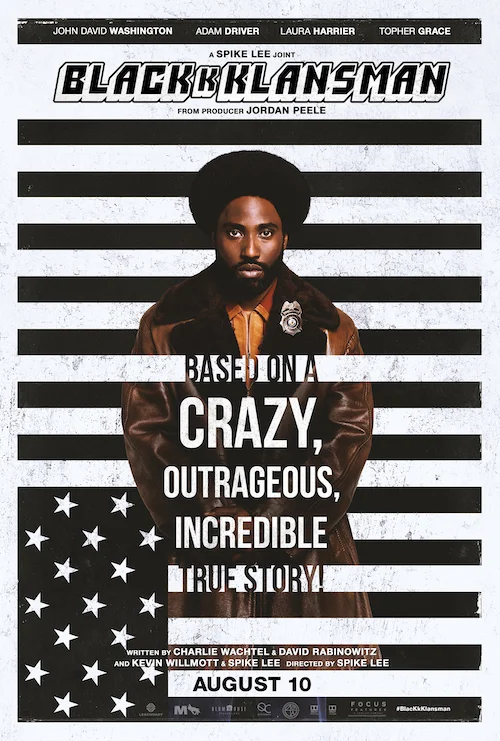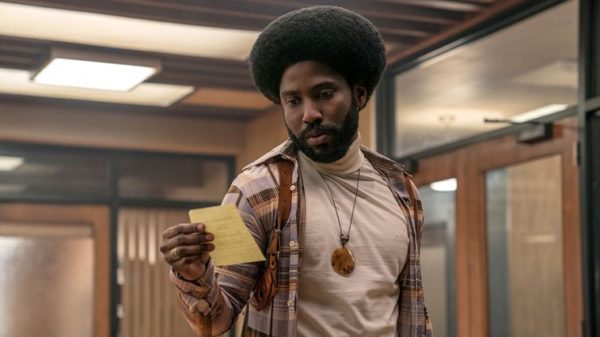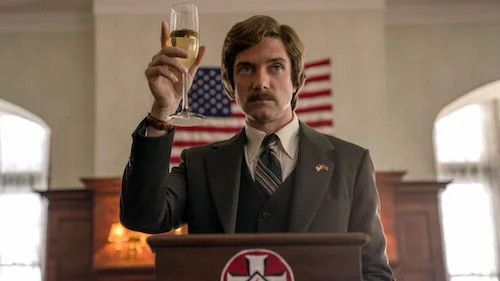BlacKkKlansman
It might be overzealous to say, but it’s fitting, seeing as Spike Lee loves to push to the extreme: BlacKkKlansman might be one of his greatest achievements. You want an exercise in tip toeing a line between discussion and danger? This is your film. Despite being heavily influenced by the blaxploitation films of the ‘60s and ‘70s, not one second here feels like actual exploitation. Sure, Lee loves to push buttons and speak his mind in very literal senses, yet none of this feels like shock value or a determination to make you feel ill or upset. There is true merit to everything here. Lee is obviously an experienced filmmaker with a huge sense of mastery behind his craft. When he made many mediocre to flat out bad works (I’m looking at that Old Boy remake), many newcomers to cinema might have wondered why his name was said with such praise. None of us ever forgot Do The Right Thing. We never pushed She’s Gotta Have It to the side. This is Spike Lee we’re talking about: one of the biggest lovers of film in the world. Even his worst experiments had purpose to even be attempted. Then comes BlacKkKlansman, and it all finally comes to fruition. Lee’s still got it, and it is damn good.
This is the true story of Ron Stallworth’s professional ascent up in the world as a person of colour in a bigoted America; he does this by descending down into the racist hell of the Klu Klux Klan. Stallworth is played brilliantly by John David Washington, who might have stolen some talent from his good ol’ pops Denzel on the way out the door sometime. He is charismatic and stoic, and only uses one moment to lunge at the audience with a powerful monologue. This is a great leading role that commands each and every scene (either as an anchor, or as the starting gun); it’s a shame there wasn’t room for him in the Best Actor category like we all thought.
John David Washington as Ron Stallworth
Stallworth’s story about infiltrating the Klu Klux Klan is just fantastic on paper. Lee and company knew this, and so they let the tale do most of the talking. Maybe after a similar path taken by 2015’s Spotlight, BlacKkKlansman is not quiet with its plot, but it knows that it doesn’t need to carry it in any melodramatic way whatsoever. This might strip the film of synthetic feel, but that makes it all the better in the long term. This isn’t about visiting the film once and moving on. This is about revisiting it and understanding that it is still of the utmost importance to digest. Its replay-ability is unquestionable. The story still stings. The information you know going into a second viewing enhances earlier exchanges. This is a once in a lifetime story that doesn’t need sugar coating or padding.
There are some slight embellishments here, mostly because Lee wanted to make a current blaxploitation film; with that in mind, these changes are more than welcome. The film is pushed closer to the ‘60s than the ‘80s for this very reason. The climax is also dazzled up just a tiny bit (okay, a lot), but does it really matter when the vast majority of the film is almost strictly factual and insane anyways? These tweaks were for Lee’s grandest statement with this film: we have come a long way, but still have many miles to go. The fact that BlacKkKlansman is relevant as a debate on our current society is actually beyond depressing.
Lee feels the same way. That mastery I was talking about earlier? Lee knows how to juxtapose film elements, because he knows the language inside and out. He isn’t just fluent. He can reinvent, like only the greatest of filmmakers are capable of. The film starts off with a snippet of Gone With The Wind: a tribute to a classic film, but also a raising of awareness of how racially ignorant many people were less than one hundred years ago. It is followed with a cameo appearance by Alec Baldwin, whose character decries persons of colour from being treated like regular people. He tries again and again to get the words right. It’s funny to see him blunder; it’s horrifying to know he is choosing the most hateful ways to get his points across.
Topher Grace as David Duke
This different opening is bookended with a documentarian ending. Recent footage of the Unite The Right Rally show that the monstrous people in BlacKkKlansman still exist. Even literally: David Duke is still kicking in this footage. It removes the interpretation of an adaptation. It makes the fictional element of a biopic disappear for a few minutes. We had fun and games this film, as well as thrills and chills. At the end of the day, this was a (mostly) real story, and its subjects continue to this day.
But let’s not dwell on the depressing details too heavily. We still need to discuss the bonkers story. How an African American officer was able to become an official member of the Klu Klux Klan is still impossible to believe, even after having seen the film and read into the story multiple times. The mission starts off rather easy: Stallworth calls in and yells some racial slurs. Boom. He’s in. But then it gets a little more complicated. Stallworth has to visit in person, has to be approved, go through some tests, and actually get baptized. Stallworth recruits a fellow officer (played by Adam Driver) to perform as him in person, so the mission wouldn’t end within a matter of seconds. The two sides of this new Stallworth (yes, unfortunately Stallworth used his own name when joining the Klan)have to coexist for the case to continue. As you can imagine, things begin to get very tangled. Stallworth finds solace in the black student union and its president Patrice (played by Laura Harrier) while undercover. Flip (the in person Stallworth) is being invited to many events, essentially because he is doing well with most of the members outside of the skeptical Felix (who continuously asks Stallworth to prove his hatred of all marginalized people, particularly the Jewish community). The real Stallworth has started a correspondence with David Duke, the Grand Wizard himself (played by Topher Grace).
BlacKkKlansman is a minefield, that is sewn together by awkwardly funny moments. So much of the film is hilarious because of the sheer gall of it all, ranging from “I can’t believe this mission is happening”, down to “I can’t believe people actually think these things of other people”. Between the tension and the spirit, you will almost feel a literal leap from emotion to emotion, sometimes within a single shot. This is appropriate, because social politics in 2018 (now 2019) does feel like a new minefield every day. Bigotry isn’t even spotted, anymore; no, it’s flat out admitted by many now. Many discussions are heated, and it’s very hard to hide intolerance. Social media has exposed true natures of many, and each and every tweet or post is like an explosion to the face. You can’t believe discrimination to such a degree still exists, and yet you basically witness it in every comment section of a major news source on an hourly basis.
This is why BlacKkKlansman is not just good, but rather it is essentially relevant. This isn’t a marginalized group beating a dead horse, as many naysayers would like you to believe when it comes to persons of colour being heard in Hollywood. That latter point alone proves that this conversation still is damn well necessary. BlacKkKlansman is a peculiar tale of yesteryear brought up today for a few reasons. It is still unbelievable decades later. It is still current decades later. It is still America decades later. Maybe Lee’s selling point is that many people find it more out-there that an African American made it into the Klu Klux Klan, than people finding the Klu Klux Klan still existing unbelievable. From the bold opening and ending sequences, the Blaxploitation influences, the nerve wracking story, and the many powerful dialogues, Spike Lee essentially hands over BlacKkKlansman and says “here we are”. Out of all of the bold statements Lee has ever said, BlacKkKlansman, metaphysically and literally, might be his boldest.
Andreas Babiolakis has a Masters degree in Film and Photography Preservation and Collections management from Ryerson University, as well as a Bachelors degree in Cinema Studies from York University. His favourite times of year are the Criterion Collection flash sales and the annual Toronto International Film Festival.







